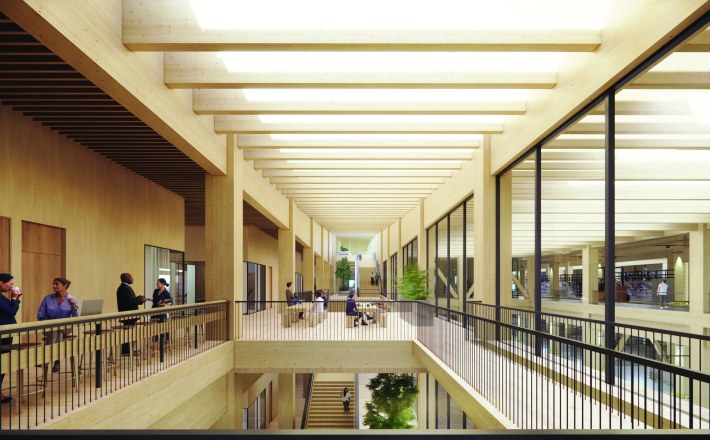Take a walk on the wild side
Green Traveller, Richard Hammond, takes a look at rewilding in action.
As our flat-bottomed boat glided effortlessly out of the winding channels of the Evros Delta to the open water, our guide, local photographer Nasos Nalbantis, told us to keep an eye on a pale patch on the blue-sky horizon. It looked like a sandbank, but as the boatman, Christos, expertly navigated us closer through the shallow water, we realised that it was a huge group of pale pink flamingos. Still some way off, we watched them for about 15 minutes, then one by one, they started to run flat-footed across the water, eventually taking off and rising to about 10m in the air. Dozens of them flew right past us, their deep pink and black wings beating majestically.

No matter how many wildlife documentaries you’ve watched, nothing quite compares to seeing spectacular birds like this in their wild, natural habitat. Evros Delta is in the far east of Macedonia where the Evros River meets the Aegean Sea in a thriving mass of lagoons, reedbeds and lakes close to the border between Greece and Turkey. This unique habitat, declared a Ramsar-protected wetland in 1974 to protect it from the threat of drainage works, is home to hundreds of species of birds, and is one of several biodiversity hotspots in the area. Forty miles to the north is the Dadia-Lefkimi-Soufli Forest National Park where an incredible 36 of Europe’s 38 species of diurnal birds of prey can be seen – from sparrowhawks and red-footed falcons to imperial and golden eagles. To the west lies the Nestos River, whose crystal-clear water meanders through a particularly dramatic stretch of the Rhodope Mountain range that extends through the north of Macedonia into Bulgaria; at the crossroads between Europe and the Asian continent, it is one of the most biodiverse areas in all of Europe.
It’s large-scale ecosystems like the Rhodope Mountains that have become a focus for rewilding – restoring habitats back to how nature intended and introducing keystone species to encourage biodiversity to thrive. Although not a new concept, in recent years, rewilding has recently been identified as a means to combat both climate change and the biodiversity emergency, on land and at sea, through the storing of carbon in soil, bogs, scrub and trees, and the restoration of seagrass meadows and forests.
Rewilding is about restoring what we've lost
Duncan Groassart, Founder and Managing Director of Journeys With Purpose, which arranges for visitors to see rewilding in action in some of the most beautiful places on the planet, says rewilding is a progressive approach to conservation. “We’re moving away from traditional conservation, which is about protecting what is left, to rewilding, which is about restoring what we’ve lost."
Increasingly the income and profile of nature-based trips run by the likes of Journeys With Purpose is helping to fund and publicize rewilding projects. Rewilding Europe Travel launched in the summer of 2022 to organise small group tours to many of Europe’s rewilding landscapes. Each Rewilding Europe Travel trip includes the cost of a Rewilding Credit that contributes towards the funding of community-based rewilding projects that help biodiversity restoration, supports livelihood development in nature-based economies, and supports climate change mitigation through woodland and peatland restoration projects. An 8-day trip to the Rhodope Mountains in Bulgaria with Rewilding Europe Travel includes three days of expert photography tuition by Bogdan Boev, a local professional photographer, along the riverine habitat of the Thracian Plain, and three days in forest bird hides in wetlands and woodlands along the migration routes by the Maritsa River.

The Carpathians in Romania is another European hotspot for rewilding. Forest without Frontiers and the European Nature Trust are working with the Foundation Conservation Carpathia, that is aiming to establish the largest forested national park in Europe–home to wolves, bears and lynx. Steppes Travel runs a five-day trip to this extensive forest in the Carpathian Mountains that’s just two and a half hours drive from Romania’s capital. After a day visiting the city of Bucharest, guests are taken by professional guides on a private tour of the conservation area on horseback, including one night in a wildlife hide looking out for bears, boar and deer. The trip costs from £2,295 per person (excluding flights), which includes a £500 contribution to the work of the Foundation Conservation Carpathia.
Further afield, JWP’s flagship rewilding destination is the Iberá Wetlands in Argentina where Fundación Rewilding Argentina (FRA) has created a national park that preserves over 700,000 hectares. This September, it is organising a trip to the area led by Sofía Heinonen, Executive Director of FRA who has helped reintroduce the jaguar to the region. The week-long trip involves staying in locally-owned lodges in the heart of the reserve from where visitors spend the days alongside biologists tracking and monitoring wildlife, including giant anteaters, deer, jaguar and macaws, exploring the vast plains by kayak, on foot and on horseback. These kinds of trips are not merely wildlife watching holidays. As Duncan Grossart explains, “they’re impact learning experiences” that provide visitors with privileged access to areas of great natural beauty that stimulate an emotional attachment to the work that is being done, while also providing much needed funds for the local partners to continue to rewild huge areas of natural habitat that's so desperately needed.
Tourism that makes a difference
Protected areas in Europe where your visit contributes to protecting nature and rural communities
Albania
Divjakë Karavasta National Park: Home to the curly pelican and over 260 bird species, the lagoons of the Divjakë Karavasta National Park are one of the best places to go birdwatching in Albania. Albanian Trip organises day trips as well as 6-day group tours donating 20% of the income to the park’s forestation and other much-needed restoration projects. Albanian Trip

Croatia
Cres Lošinj Marine Protected Area: See bottlenose dolphins in their natural environment on a dolphin watching boat trip organised by Dophin Watching Adriatic in cooperation with the Blue World Institute, which is working to protect the marine life of the Adriatic Sea. After the boat trip, visit the Institute’s excellent Lošinj Marine Education Centre in Veli Lošinj with interactive multimedia presentations about the marine world. Dolphin Watching Adriatic

Italy
Abruzzo National Park: Explore the wilds of the Apennines in central Italy with researchers from conservation organisation Salvamo L’Orso, which is working to protect the remaining population of Marsican brown bears. Set camera traps, follow bear (as well as wolf tracks) and learn about the organisation’s efforts to protect the wildlife. The trip–a collaboration between the European Nature Trust and Steppes Travel–includes a donation to Salviamo l’Orso’s conservation work, and features a memorable night in a spectacular wildlife cabin and wine-tasting in the world-renowned Montepulciano d’Abruzzo. Spectacular stuff. SteppesTravel

Crete
Asterousia Mountain Range Biosphere Reserve: Walk up to the sacred summit of Mount Kofinas (the highest of the Asterousia Mountains at 1,232m) and swim in the crystal-clear waters of the Agiogarago beach on a week-long trip organised by local travel agency Cretan Adventures. You’ll stay at the Thalori Ecotourism Retreat– 20 traditional houses that are breathing new life into the mountainous village of Kapetaniana, where your stay will help bring much need income to local producers who supply fresh locally grown produce for the retreat’s restaurant. Cretan Adventures

Portugal
Great Côa Valley: Home to growing populations of wild boar, roe deer, red deer, wolf and Iberian Lynz, this biodiversity hotspot close to the Spanish border between the Douro River and Malcata mountain ranges is the location of a week-long trip arranged by Rewilding Europe Travel. They provide a credit for each trip that goes towards funding local community-based rewilding projects. Rewilding Europe Travel




